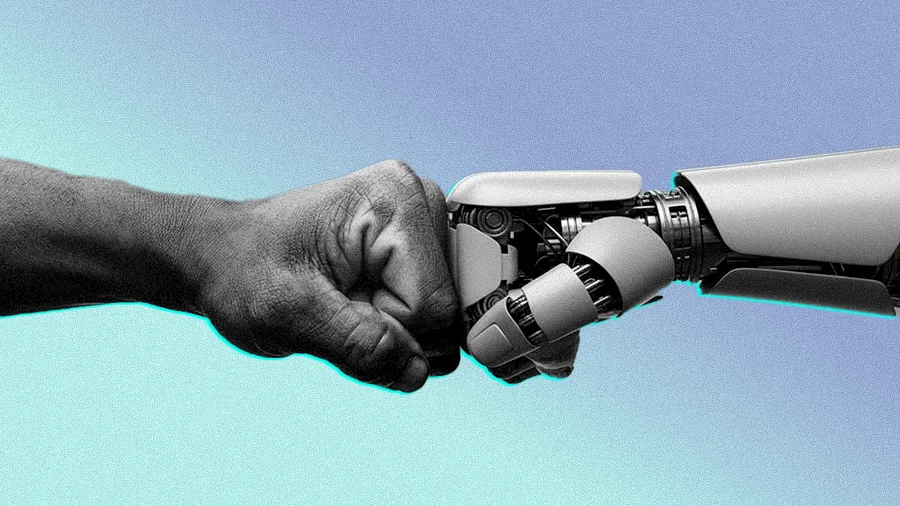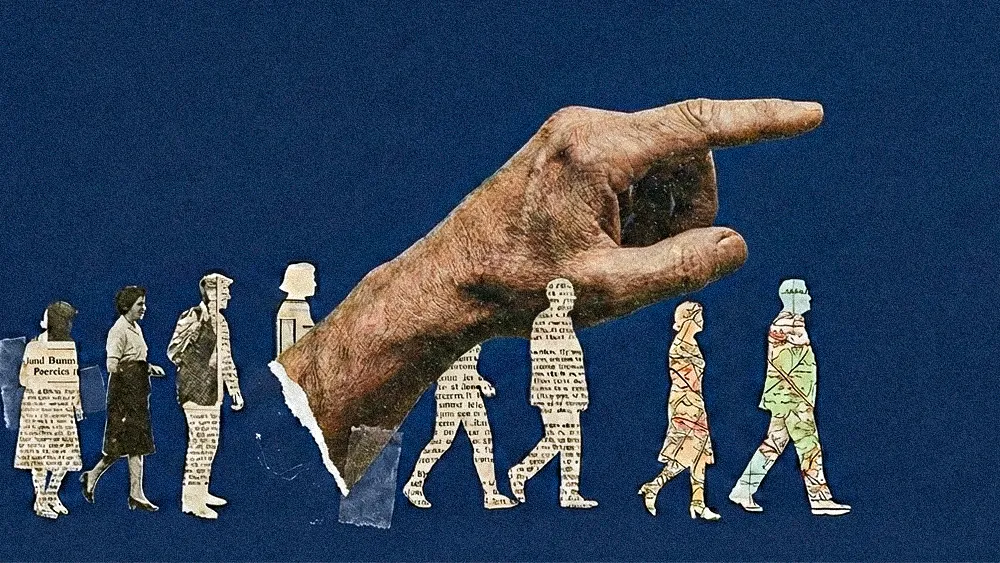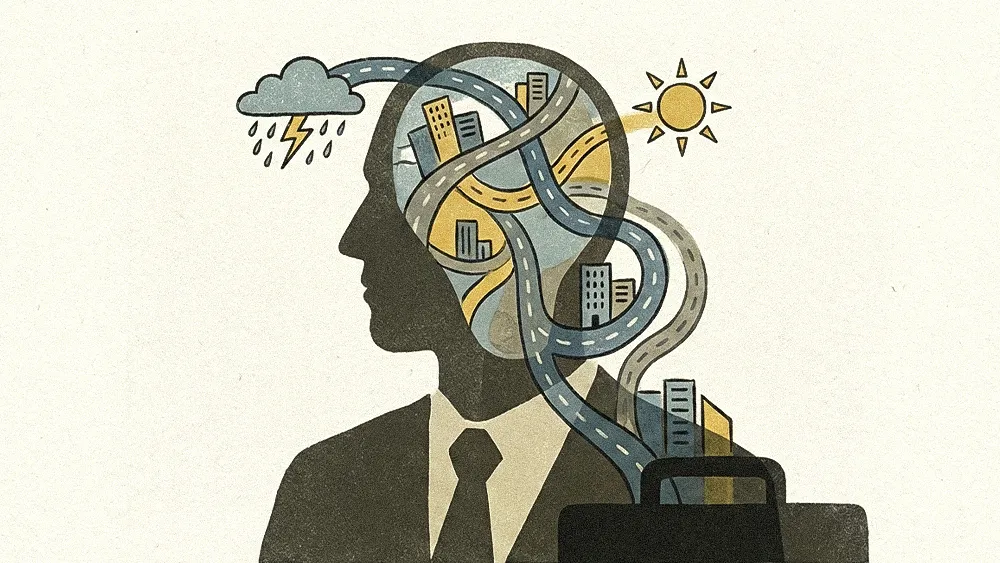Redefining corporate mentorship with AI-powered questions and human partners

Key Points
Traditional “mentor-as-expert” models fail to cultivate the diversity of thought that modern companies need.
David Porter, Head of DD&T Learning and Development at Takeda and formerly Moderna, advocates for a “mentee-driven” model, where mentors shift from expert to Socratic guide.
He explains that AI can be reframed as a reflective tool for “context mining,” helping employees uncover their own patterns of success, called “zones of genius.”
This approach combines AI-driven self-awareness with human wisdom, creating a partnership where employees can find new career paths and opportunities.
Leveraging AI to ask you the questions, instead of the other way around, helps you see the art of what's possible in your career and find your zones of genius.

David Porter
Head of DD&T Learning and Development
David Porter
Corporate learning programs often prioritize delivering answers, but true employee growth stems from challenging assumptions, not just receiving information. To shift mindsets, learning leaders should encourage a novel use of AI, not as a search engine for solutions, but as a reflective tool to uncover an individual’s unique strengths and overlooked patterns of success.
That’s the approach championed by David Porter, who recently transitioned from Sr. Director of Digital & Leadership Learning at Moderna to Head of DD&T Learning and Development at Takeda. A prominent advocate for integrating generative AI in skill enhancement, Porter believes that fostering adaptable leaders means moving beyond top-down instruction towards guided self-discovery. He contends that the traditional “mentor-as-expert” model, which often aims to “create clones,” ultimately fails to cultivate the diverse thinking companies need. This failure is particularly acute for Gen Z workers, with nearly 74% reporting a lack of career mentorship, contributing to a significant confidence crisis in the workforce.
Attack of the clones: “The idea that a mentor needs to create a clone of themselves is wrong. Even if that was successful, that just creates more people like you. And that’s not what companies need; they need diversity of thought, background, and perspective,” he explains. Porter’s alternative is a “mentee-driven” model, where the mentor shifts from expert to Socratic guide. When the mentee sets the agenda, the dynamic fosters active collaboration, instead of passive listening. “When a mentor just says, ‘Here’s the program,’ the mentee can passively let it wash over them. It’s a TED talk, a lecture. They think, ‘I don’t need a lecture. I need a partner.'”
But that raises an interesting question: how can a mentee lead if they don’t know where they’re going? Porter’s answer is to reframe AI as a reflective tool. Similar to his philosophy on AI fitness, focusing on empowerment over instruction, he calls this exercise “context mining.” Feed AI your own work history, and prompt it to ask clarifying questions to uncover overlooked skills, or “zones of genius.”
AI flips the script: “Leveraging AI to ask you the questions, instead of the other way around, helps you see the art of what’s possible in your career and find your zones of genius,” Porter says. The principle of breaking established patterns extends to human interaction. At a previous company, he tackled the limitations of an internal-only mentor pool by building a network with other companies for what he calls “Tinder for mentor-mentee relationships.” As he’s written publicly, this cross-pollination sparks creative problem-solving by harvesting ideas from outside an employee’s industry.
Reawakening curiosity: His philosophy is rooted in a belief in reawakening an innate human trait. Citing Neil deGrasse Tyson, Porter explains that humans are born curious, and a mentor’s job is to spark that curiosity back to life. “Your job as a leader isn’t to teach. Your job is to awaken the curiosity and hunger in people so that they become the best teachers. People are the best teachers, better than AI will ever be,” he says.
For HR and Learning & Development leaders, these insights point toward a new approach to mentorship rooted in discovery. Porter’s model envisions a powerful partnership between human and machine, where mentee-led programs empower individuals. To implement this, organizations should encourage employees to drive their own development agendas, integrate tools that allow individuals to use AI for context mining and self-discovery, and challenge conventional thinking by connecting mentees with diverse external perspectives. The future of mentorship isn’t about handing down answers. It’s about building systems, combining AI-driven insights with diverse human wisdom to help employees ask better questions and unlock new paths. “What a perfect way to use AI and a mentor program—to go from where you are to where you didn’t even know you wanted to go,” Porter says.
What a perfect way to use AI and a mentor program—to go from where you are to where you didn't even know you wanted to go.

David Porter
Head of DD&T Learning and Development
David Porter
What a perfect way to use AI and a mentor program—to go from where you are to where you didn't even know you wanted to go.

David Porter
Head of DD&T Learning and Development
David Porter
Related articles
TL;DR
Traditional “mentor-as-expert” models fail to cultivate the diversity of thought that modern companies need.
David Porter, Head of DD&T Learning and Development at Takeda and formerly Moderna, advocates for a “mentee-driven” model, where mentors shift from expert to Socratic guide.
He explains that AI can be reframed as a reflective tool for “context mining,” helping employees uncover their own patterns of success, called “zones of genius.”
This approach combines AI-driven self-awareness with human wisdom, creating a partnership where employees can find new career paths and opportunities.

David Porter
David Porter
Head of DD&T Learning and Development

Head of DD&T Learning and Development
Corporate learning programs often prioritize delivering answers, but true employee growth stems from challenging assumptions, not just receiving information. To shift mindsets, learning leaders should encourage a novel use of AI, not as a search engine for solutions, but as a reflective tool to uncover an individual’s unique strengths and overlooked patterns of success.
That’s the approach championed by David Porter, who recently transitioned from Sr. Director of Digital & Leadership Learning at Moderna to Head of DD&T Learning and Development at Takeda. A prominent advocate for integrating generative AI in skill enhancement, Porter believes that fostering adaptable leaders means moving beyond top-down instruction towards guided self-discovery. He contends that the traditional “mentor-as-expert” model, which often aims to “create clones,” ultimately fails to cultivate the diverse thinking companies need. This failure is particularly acute for Gen Z workers, with nearly 74% reporting a lack of career mentorship, contributing to a significant confidence crisis in the workforce.
Attack of the clones: “The idea that a mentor needs to create a clone of themselves is wrong. Even if that was successful, that just creates more people like you. And that’s not what companies need; they need diversity of thought, background, and perspective,” he explains. Porter’s alternative is a “mentee-driven” model, where the mentor shifts from expert to Socratic guide. When the mentee sets the agenda, the dynamic fosters active collaboration, instead of passive listening. “When a mentor just says, ‘Here’s the program,’ the mentee can passively let it wash over them. It’s a TED talk, a lecture. They think, ‘I don’t need a lecture. I need a partner.'”
But that raises an interesting question: how can a mentee lead if they don’t know where they’re going? Porter’s answer is to reframe AI as a reflective tool. Similar to his philosophy on AI fitness, focusing on empowerment over instruction, he calls this exercise “context mining.” Feed AI your own work history, and prompt it to ask clarifying questions to uncover overlooked skills, or “zones of genius.”

David Porter
David Porter
Head of DD&T Learning and Development

Head of DD&T Learning and Development
AI flips the script: “Leveraging AI to ask you the questions, instead of the other way around, helps you see the art of what’s possible in your career and find your zones of genius,” Porter says. The principle of breaking established patterns extends to human interaction. At a previous company, he tackled the limitations of an internal-only mentor pool by building a network with other companies for what he calls “Tinder for mentor-mentee relationships.” As he’s written publicly, this cross-pollination sparks creative problem-solving by harvesting ideas from outside an employee’s industry.
Reawakening curiosity: His philosophy is rooted in a belief in reawakening an innate human trait. Citing Neil deGrasse Tyson, Porter explains that humans are born curious, and a mentor’s job is to spark that curiosity back to life. “Your job as a leader isn’t to teach. Your job is to awaken the curiosity and hunger in people so that they become the best teachers. People are the best teachers, better than AI will ever be,” he says.
For HR and Learning & Development leaders, these insights point toward a new approach to mentorship rooted in discovery. Porter’s model envisions a powerful partnership between human and machine, where mentee-led programs empower individuals. To implement this, organizations should encourage employees to drive their own development agendas, integrate tools that allow individuals to use AI for context mining and self-discovery, and challenge conventional thinking by connecting mentees with diverse external perspectives. The future of mentorship isn’t about handing down answers. It’s about building systems, combining AI-driven insights with diverse human wisdom to help employees ask better questions and unlock new paths. “What a perfect way to use AI and a mentor program—to go from where you are to where you didn’t even know you wanted to go,” Porter says.




